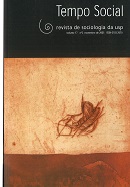Work viewed from below
DOI:
https://doi.org/10.1590/S0103-20702005000200016Keywords:
Work organization, Post-fordism, Teamwork, Social class, FlexibilityAbstract
This paper approaches a particular type of work organization called production cells. That model is analized in its application through plants in the garment industry, in the state of São Paulo, Brazil. It focused on the working women experience under that work model, from which some aspects are stressed in this paper such as the payment system, the regulation of work by/of the worker's group, the training and its skill features, the productive flexibility, and the meaning of the geographical plant de-localisation to the worker group itself. Such aspects appear to be a counterpoint to the collective experience that moulded class identity in the past and that is, nowadays, being destroyed. One of the reasons for that fact is supposed to be the well-established private initiatives made by companies related to their workforce. This kind of strategies, among which production cells are a good example, circumscribe the labor contest to the inner space of the company level. The detailed report of cases discussed here intend to contribute with some elements to a comprehensive appreciation of the work organization debate as well as its further theoretical inferences in terms of the social class paradigm.Downloads
References
DEJOURS, Christophe. (1991), A loucura do trabalho. São Paulo, Oboré/Cortez.
DURAND, J. P. (2003), “A refundação do trabalho no fluxo tensionado”. Tempo Social, 1 (15): 139-158.
ESPING-ANDERSEN, Gösta. (1990), The three worlds of welfare capitalism. Cambridge (UK), Polity Press.
ESTANQUE, Elísio. (2000), Entre a fábrica e a comunidade: subjectividades e práticas de classe no operariado do calçado. Porto, Afrontamento.
FORD, Henry. (1954), “Minha vida, minha obra”. In: Os princípios da prosperidade. Rio de Janeiro, Brand.
FOURNIER, Pierre. (1996), “Deux regards sur le travail ouvrier”. Actes de la Recherche en Sciences Sociales, 115: 80-93, décembre.
MELLO E SILVA, Leonardo. (2004), Trabalho em grupo e sociabilidade privada. São Paulo, Editora 34/Curso de Pós-Graduação em Sociologia da USP.
MONTGOMERY, David. (1980), Worker’s control in America: studies in the history of work, technology and labor struggles. Cambridge, Cambridge University Press.
NELSON, Daniel. (1984), “Le taylorisme dans l’industrie américaine, 1900-1930”. In: MONTMOLLIN, Maurice de & PASTRÉ, Olivier. Le taylorisme. Paris, La Découverte, pp. 51-66.
TAYLOR, F. W. (1987), Princípios de administração científica. 7 ed. São Paulo, Atlas.
THOMPSON, Edward P. (1968), The making of the English working class. Middlesex, Penguin Books.
ZARIFIAN, Philippe. (1998), Travail et communication: essai sociologique sur le travail dans la grande entreprise industrielle. 2 ed. Paris, PUF.
Downloads
Published
Issue
Section
License
Copyright (c) 2015 Tempo Social

This work is licensed under a Creative Commons Attribution-NonCommercial 4.0 International License.


